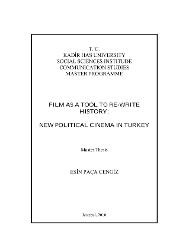| dc.contributor.advisor | Spence, Louise | en_US |
| dc.contributor.author | Paça Cengiz, Esin | |
| dc.date.accessioned | 2020-07-22T10:27:17Z | en_US |
| dc.date.available | 2020-07-22T10:27:17Z | en_US |
| dc.date.issued | 2010 | en_US |
| dc.identifier.uri | https://hdl.handle.net/20.500.12469/3067 | |
| dc.description.abstract | In order to "construct" a national narrative, unsettling moments of Turkish history have been disavowed by the official discourse in Turkey. As a consequence, uneasy and therefore repressed knowledge of the past, which has not been appropriated as a part of the official discourse on national history, is finding its existence in cinematic representations. Along with the mainstream films in which the official discourses on history resonate, the growing interest in representing the past in cinema in Turkey has also resulted in the emergence of a new political cinema. This thesis argues that, unlike mainstream historical films which employ conventional narration strategies and propose that they are reinstalling the missing pieces in the national historical narrative, new political cinema in Turkey adopts an experimental form and remarks that history remains elusive and incomplete. By examining two recent films of the new political cinema in Turkey, Sonbahar / Autumn ( Özcan Alper, 2008) and Bulutları Beklerken / Waiting for the Clouds(Yeşim Ustaoğlu, 2004) this thesis suggests that new political films attempt to revise history and its narration by using cinematic means in an unprecedented way. And they incite their viewers to reflect on historical thinking and their relationship with it. | en_US |
| dc.description.abstract | Ulusal bir anlatı "oluşturma" süreci içerisinde, Türk tarihinin çalkantılı anları ülkedeki resmi söylem tarafından inkar ediliyor. Bunun sonucu olarak, ulusun "şanlı" tarihinin içinde bir türlü uydurulamayan ve bu yüzden bastırılan tarihsel olaylar sinema temsilleri olarak geri dönüyorlar. Türkiye'de giderek büyüyen geçmişi temsil etme eğilimi resmi ideolojinin tarih üzerindeki söylemlerini tekrar eden ana akım filmlerin yanı sıra, yeni bir politik sinemanın oluşması ile sonuçladı. Bu tez, konvansiyonel anlatım stratejilerini benimseyen ve tarihin eksik parçalarını yerlerine geri koyarak onu tamamlama iddiasında olan ana akım tarihsel filmlerin aksine, Türkiye'deki yeni politik sinemanın deneysel bir biçim oluşturmaya çalışarak tarihin muğlak ve tamamlanamayan bir olgu olduğunu önü sürdüğünü savunuyor. Türkiye'deki yeni politik sinemanın iki örneği olarak Bulutları Beklerken (Yeşimustaoğlu, 2004) ve Sonbahar (Özcan Alper, 2009) filmlerini inceleyen, bu tez, yeni politik filmlerin sinemanın anlatım araçlarını alışılmışın dışında bir biçimde kullanarak, hem tarihi hem de onun temsil edilme biçimini yeniden yazdığını ortaya koyma amacı güdüyor. Bu yolla, bu filmler hem tarihsel düşüncenin kendisini hem de bizlerin bu düşünce ile kurduğu ilişkiyi tekrar gözden geçirmeye teşvik ediyor. | en_US |
| dc.language.iso | eng | en_US |
| dc.publisher | Kadir Has Üniversitesi | en_US |
| dc.rights | info:eu-repo/semantics/openAccess | en_US |
| dc.subject | Representation of history | en_US |
| dc.subject | Political cinema | en_US |
| dc.subject | Historiography | en_US |
| dc.subject | Turkish cinema | en_US |
| dc.subject | Tarih temsilleri | en_US |
| dc.subject | Politik sinema | en_US |
| dc.subject | Tarih yazımı | en_US |
| dc.subject | Türk Sineması | en_US |
| dc.title | Film as a tool to rewrite history: New political cinema in Turkey | en_US |
| dc.type | masterThesis | en_US |
| dc.department | Enstitüler, Lisansüstü Eğitim Enstitüsü, İletişim Bilimleri Ana Bilim Dalı | en_US |
| dc.relation.publicationcategory | Tez | en_US |
| dc.identifier.yoktezid | 261961 | en_US |
















